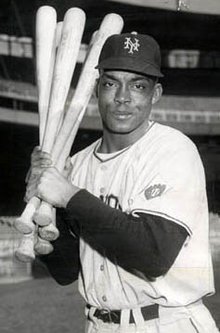

 Monte Irvin
Monte Irvin
Date and Place of Birth: February 25, 1919 Halesburg, Alabama
Baseball Experience:
Major League
Position: Second Base
Rank: Sergeant
Military Unit: GS Engineers 1313th Battalion US Army
Area Served: European Theater of Operations
Major League Stats: Monte Irvin on Baseball-Almanac
Irvin was
drafted by the Army in 1942. He spent three years with the GS
Engineers, 1313th Battalion. The battalion was first sent to
England, then after D-Day to France and Belgium, where they built
bridges and repaired roads. In late 1944, his unit was deployed in
Reims, France, as a secondary line in case the Germans broke through
at Bastogne during the Battle of the Bulge.
Monte Irvin
was elected to the Baseball Hall of Fame by a special Negro Leagues
committee in 1973. Irvin is also an inductee in the Alabama Sports
Hall of Fame.
Created May 13, 2007.
Copyright © 2015 Gary Bedingfield (Baseball
in Wartime). All Rights Reserved.

Irvin recently explained that black soldiers had a rough time in the
Army because white soldiers treated them badly. "The black troops
were treated better in Europe than they were in the US," Irvin said.
"They got a taste of freedom over there."
He agrees, however, that many white American soldiers realized the
incongruity of fighting in Europe to free oppressed people while
blacks were oppressed at home, and that may have made things a
little easier for the black soldiers when they returned.
In addition to the psychological trauma Irvin faced in combat, he
also developed tinnitus, a ringing in the ears, that affected his
dexterity. That and three years away from baseball made his return
to the game difficult.
When he returned to the Negro Leagues in 1946, he was approached by
Branch Rickey of the Brooklyn Dodgers, but having been away from
baseball for three years, Irvin felt he was not ready and needed to
get into shape. Had he accepted Rickey's offer he may have been the
first black major leaguer.
Irvin led the Negro National League hitters in 1946 with a .346
average. In 1949, aged 30, he signed with the New York Giants. He
spent eight years in the major leagues with the Giants and Cubs and
finished with a lifetime batting average of .293.
A back injury forced Irvin to retire after the 1956 season. He
became a scout for the Mets in 1967 and in 1968 he became Assistant
Director of Public Relations on the Baseball Commissioner's staff.